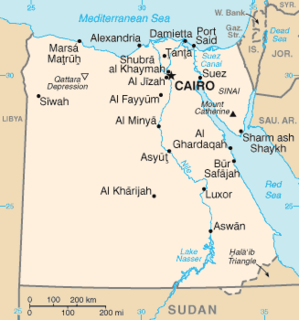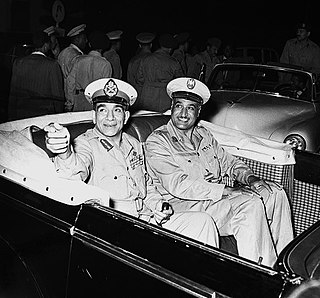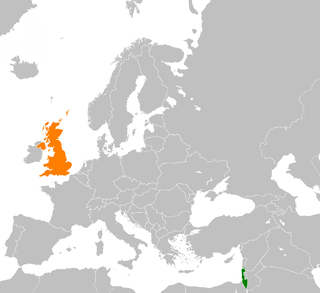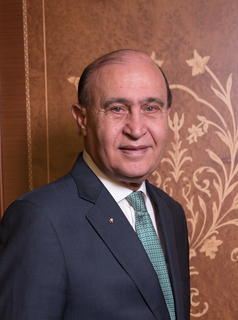Related Research Articles

The history of Egypt has been long and wealthy, due to the flow of the Nile River with its fertile banks and delta, as well as the accomplishments of Egypt's native inhabitants and outside influence. Much of Egypt's ancient history was a mystery until Egyptian hieroglyphs were deciphered with the discovery and help of the Rosetta Stone. Among the Seven Wonders of the Ancient World is the Great Pyramid of Giza.

Sudan, officially the Republic of the Sudan, is a country in Northeast Africa. It borders the countries of Central African Republic, Chad, Egypt, Eritrea, Ethiopia, Libya, South Sudan, and the Red Sea. It has a population of 44.91 million people as of 2021 and occupies 1,886,068 square kilometres, making it Africa's third-largest country by area, and the third-largest by area in the Arab League. It was the largest country by area in Africa and the Arab League until the secession of South Sudan in 2011, since which both titles have been held by Algeria. Its capital is Khartoum and its most populated city is Omdurman.

The United Kingdom of Great Britain and Northern Ireland, commonly known as the United Kingdom (UK) or Britain, is a sovereign country in north-western Europe, off the north-western coast of the European mainland. The United Kingdom includes the island of Great Britain, the north-eastern part of the island of Ireland, and many smaller islands within the British Isles. Northern Ireland shares a land border with the Republic of Ireland. Otherwise, the United Kingdom is surrounded by the Atlantic Ocean, with the North Sea to the east, the English Channel to the south and the Celtic Sea to the south-west, giving it the 12th-longest coastline in the world. The Irish Sea separates Great Britain and Ireland. The total area of the United Kingdom is 93,628 square miles (242,500 km2), with an estimated population in 2020 of 68 million.

Egypt was a major battlefield in the North African campaign during the Second World War, being the location of the First and Second Battles of El Alamein. Legally an independent kingdom, and an equal sovereign power in the condominium of Anglo-Egyptian Sudan, in reality Egypt was heavily under the coercive influence of the United Kingdom, a state of affairs that had persisted since the United Kingdom intervened militarily in the Orabi Revolt in favour of Egypt's Khedive, Tewfik Pasha, in 1882, subsequently occupying the country. The continuing British dominance of Egyptian affairs, including British efforts to exclude Egypt from the governance of Sudan, provoked fierce Egyptian nationalist opposition to the United Kingdom. Consequently, despite playing host to thousands of British troops following the outbreak of the conflict, as it was treaty bound to do, Egypt remained formally neutral during the war, only declaring war on the Axis powers in the spring of 1945. Though escaping the fate of Iraq, and Iran, both of whose governments were toppled by the United Kingdom during the war, Egypt experienced the Abdeen Palace Incident, a confrontation between Egypt's King Farouk and the British military in 1942, the results of which would contribute directly to the Egyptian Revolution of 1952 a decade later.

Siddig El Tahir El Fadil El Siddig Abdurrahman Mohammed Ahmed Abdel Karim El Mahdi is a Sudanese-born English actor and director known professionally as Siddig El Fadil and subsequently as Alexander Siddig.
A condominium in international law is a political territory in or over which multiple sovereign powers formally agree to share equal dominium and exercise their rights jointly, without dividing it into "national" zones.

The current flag of Sudan was adopted on 20 May 1970 and consists of a horizontal red-white-black tricolour with a green triangle at the hoist. The flag is based on the Arab Liberation Flag of the Egyptian Revolution of 1952, as are the flags of Egypt, Iraq, Syria, Yemen, and Palestine and formerly of the United Arab Republic, North Yemen, South Yemen, and the Libyan Arab Republic.

Anglo-Egyptian Sudan was a condominium of the United Kingdom and Egypt in the Sudans region of northern Africa between 1899 and 1956, corresponding mostly to the territory of present-day Sudan, and South Sudan. Legally, sovereignty and administration were shared between both Egypt and the United Kingdom, but in practice the structure of the condominium ensured effective British control over Sudan, with Egypt having limited, local power influence in reality. Following the Egyptian Revolution of 1952, Egypt pushed for an end to the condominium, and the independence of Sudan. By agreement between Egypt and the United Kingdom in 1953, Sudan was granted independence as the Republic of the Sudan on 1 January 1956. In 2011, the south of Sudan itself became independent as the Republic of South Sudan.

The Egyptian Revolution of 1952, also known as the 23 July Revolution, was a period of profound political, economic, and societal change in Egypt that began on 23 July 1952 with the toppling of King Farouk in a coup d'etat by the Free Officers Movement, a group of army officers led by Mohammed Naguib and Gamal Abdel Nasser. The Revolution ushered in a wave of revolutionary politics in the Arab World, and contributed to the escalation of decolonisation, and the development of Third World solidarity during the Cold War.
Ash Atalla is an Egyptian-born British television producer. He has produced several British TV series such as The Office, The IT Crowd, Man Stroke Woman and People Just Do Nothing. He has also made cameo appearances in productions such as Ricky Gervais' Politics.

Egypt, officially the Arab Republic of Egypt, is a transcontinental country spanning the northeast corner of Africa and the Sinai Peninsula of Western Asia. It is bordered by the Mediterranean Sea to the north, the Gaza Strip (Palestine) and Israel to the northeast, the Red Sea to the east, Sudan to the south, and Libya to the west. In the northeast, the Gulf of Aqaba, which is the northern arm of the Red Sea measuring 24 km (15 mi) at its widest point, separates Egypt from Jordan and Saudi Arabia. Cairo is the country's capital and largest city.
Events from the year 1956 in France.

The Kingdom of Egypt was the legal form of the Egyptian state during the latter period of the Muhammad Ali dynasty's reign, from the United Kingdom's recognition of Egyptian independence in 1922 until the abolition of the monarchy of Egypt and Sudan in 1953 following the Egyptian Revolution of 1952. Until the Anglo-Egyptian Treaty of 1936, the Kingdom was only nominally independent, as the United Kingdom retained control of foreign relations, communications, the military, and Sudan. Officially, Sudan was governed as a condominium of the two states, however, in reality, true power in Sudan lay with the United Kingdom. Between 1936 and 1952, the United Kingdom continued to maintain its military presence, and its political advisers, at a reduced level.
British Arabs are citizens or residents of the United Kingdom that are of Arab ethnic, cultural and linguistic heritage or identity from different Arab countries. Arabs also come non-Arab countries as ethnic minorities.
Egyptians in the United Kingdom are Egyptian citizens or people of Egyptian ancestry who are citizens or residents of the United Kingdom.

Israel–United Kingdom relations, or Anglo-Israeli relations, are the diplomatic and commercial ties between the United Kingdom and Israel. The British embassy to Israel is located in Tel Aviv. The UK has an honorary consul in Eilat and a non-accredited consulate-general in Jerusalem, that represents the United Kingdom in that city and the Palestinian territories. Israel has three representative offices in the United Kingdom: an Embassy located in London and consulates in Cardiff and Glasgow.

Sudan–United Kingdom relations are foreign relations between Sudan and United Kingdom. Sudan has an embassy in London whilst the United Kingdom has an embassy in Khartoum. Most of the recent relations between the two countries centre on the region of Darfur.

The Sphinx of Taharqo is a granite gneiss statue of a sphinx with the face of Taharqo. He was a Nubian king, who was one of the 25th Egyptian Dynasty rulers of the Kingdom of Kush. It is now in the British Museum in London.

Egypt–United Kingdom relations refers to the bilateral relationship between Egypt and Great Britain. Relations are longstanding. They involve politics, defence, trade and education, as well as issues regarding the Suez Canal.

Vice Admiral Mohab Mamish is the chairman of the Suez Canal Authority. He was the Commander of the Egyptian Navy from 27 September 2007 until August 2012. He was also a member of the Supreme Council of the Armed Forces which de facto governed Egypt after the Egyptian Revolution of 2011.